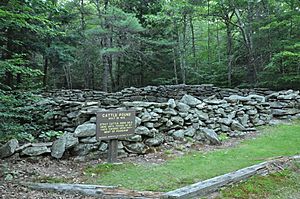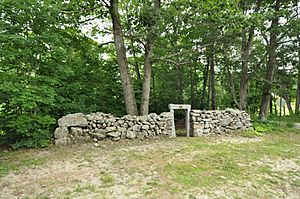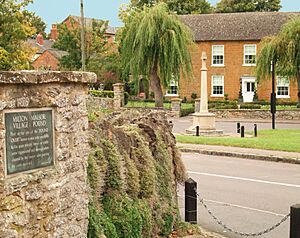Poundmaster facts for kids
A poundmaster, also called a poundkeeper, was a special local official in the past. Their main job was to look after stray farm animals like cows, horses, pigs, sheep, and geese. This role was very important in early America, especially during colonial times and into the 1800s. Unlike today, poundmasters didn't deal with stray cats or dogs. They focused only on livestock, which are farm animals.
Contents
What Did a Poundmaster Do?
The poundmaster's main duty was to collect farm animals that were wandering loose in a town or village. These animals were brought to a special place called a "pound." Sometimes the poundmaster caught them, and sometimes other officials or even regular people brought them in.
Once an animal was in the pound, the poundmaster tried to find its owner. The owner could get their animal back by paying a fine and covering the costs of caring for the animal. If an animal wasn't claimed, it would be sold at an auction. More valuable animals might have a longer waiting period before being sold.
How Were Poundmasters Chosen?
In places like New York state in the early 1800s, towns had to choose poundmasters. People would vote for them. While most town officials were chosen by secret ballot, the town clerk would write down the names of poundmaster candidates and record the votes openly. This shows how important the role was to the community.
What Were the Fees?
When an owner claimed their animal, they had to pay several fees. These included a fee for the poundmaster's work and the daily cost of feeding the animal. Sometimes, there were also fees from "fence viewers." These were people who checked if fences were properly built, especially if an animal had escaped due to a broken fence.
The Animal Pound Building
In the 1700s, a "pound" was usually a strong enclosure with stone walls, often located in the center of a town. Two examples of these old stone pounds still exist in Maine today: the Pownal Cattle Pound and the Turner Cattle Pound. They are even listed on the National Register of Historic Places because of their historical importance.
From Poundmaster to Animal Control
Today, it's rare to see farm animals wandering loose in cities. Because of this, the job of a poundmaster has changed a lot. The modern version of this role is often called an "animal control officer." These officers primarily deal with stray pets like cats and dogs, rather than livestock. Even though the term "poundmaster" isn't used much anymore, you might still find it in old local government rules, referring to the person in charge of an animal shelter.
Poundmasters in Other Countries
The role of a poundmaster wasn't just in America. It also existed in countries like Australia. In fact, the idea of a poundmaster might even go back to medieval England, showing that communities have long needed ways to manage stray animals.




